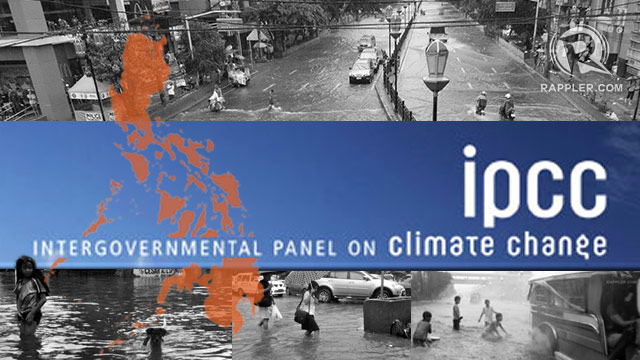SUMMARY
This is AI generated summarization, which may have errors. For context, always refer to the full article.

MANILA, Philippines – A wake-up call.
That’s how Voltaire Alferez, national coordinator of the Aksyon Klima Pilipinas, thinks Filipinos should see the just-released Fifth Assessment Report, a report on climate change compiled by the Intergovernmental Panel on Climate Change (IPCC).
The 2,000-page document, revealed to the world last September 27, is the first volume of compiled findings of thousands of peer-reviewed journals on the status and impacts of climate change, a global phenomenon in which the accumulation of greenhouse gases in the atmosphere has led to an increase in global temperature.
READ: Climate Change Commission unveils first climate change map
The voluminous report affirmed that human activites are causing of global warming, with the panel rating its certainty at 95%. The last report in 2007 said the panel was 90% convinced.
It predicted that world temperatures would rise by 0.3 to 4.8 degrees Celsius ( (0.5-8.6 degrees Fahrenheit) this century. Sea levels are projected to rise between 26 and 82 centimeters (10.4 and 32.8 inches).
There will also be an increase in heatwaves, floods and droughts, warned the report.
The worst-case scenario predicted shows temperatures rising to 4.8ºC (8.6ºF), a figure many experts call catastrophic. The United Nations targetted 2ºC as the maximum level at which the world can avoid the worst impacts of climate change.
The Philippines must act now
But despite the massiveness of the report and its implications, Aksyon Klima Pilipinas, a national network of organizations working on climate and development issues, says the report should translate to domestic action in the Philippines.
“Filipinos already feel the impacts of climate change…The national government must allocate programmed funds for the People’s Survival Fund and convene the board to help local governments adapt.
“It must stop paying lip service to renewable energy in the climate action plan and rethink its plan to build more coal plants. Finally, it must now undertake the climate-proofing of our local development plans to ensure that our communities are resilient to the effects of climate change,” he said in a statement.
READ: Are we ready for another Ondoy?
Meanwhile, Worldwide Fund for Nature CEO Lory Tan said the IPCC report must drive home the point that Filipinos have to adapt to climate change now, even if the country is not a major contributor to climate change.
“Whether or not the Philippines is responsible for what the IPCC report confirms, we will get hit. And, we will get hit hard. Extreme rainfall, intense storms, sea level rise. We know this already. How do we respond to this change?” he said.
“Business as usual will no longer cut it. We need to mainstream next practice.”
He added that the country must veer away from fossil fuel-derived energy. The combustion of fossil fuels releases greenhouse gas. From the beginning of the Industrial Revolution in 1750 until 2012, the burning of fossil fuels led to a 40% increase in the atmospheric concentration of carbon dioxide, a greenhouse gas.
There are 3 solar power plants under construction in the Philippines, he told Rappler. The government and private sector must invest in more renewable energy sources like these to meet the effects of climate change head on.
“The same applies to the way we manage water supply and water quality. We need to diversify our water supply sources,” he said in relation to the threat of more droughts in the future.
Tony La Viña, environmentalist and dean of Ateneo de Manila University’s School of Government said on Facebook, “My first impression is that the science has greatly improved, uncertainties have been narrowed, climate change is definitely worsening, the scenarios are bleak but there are options we can still take to avoid worst case scenarios. The main message is: act now.”
Dominant views
But he observed with worry the “overwhelming dominance of scientists from the North or developed countries” in the list of drafting and draft contributing authors of the report.
He noted that that while 31 of the drafting authors come from developed countries, only 3 are from developing countries. In the draft contributing authors list, 35.5 are from developed countries while 1.5 are from developing countries. The 0.5 is because one of the authors hails from Australia and Brazil.
“I worry that this dominance will be used to undermine what I think is a good, solid report,” he said.
“In view, even in scientific matters, it matters where you come from and the perspective you bring as that is still a filter you use in making conclusions. This is especially important when issues like historical responsibility and carbon budgets are addressed.”
The full, detailed report will be released on Monday, September 30. The IPCC is set to release two more volumes next year. – Rappler.com
Add a comment
How does this make you feel?
There are no comments yet. Add your comment to start the conversation.